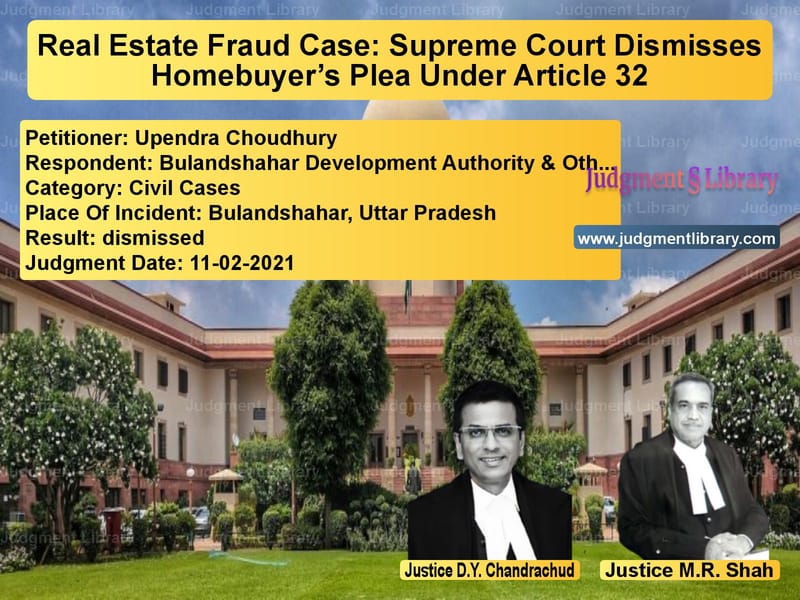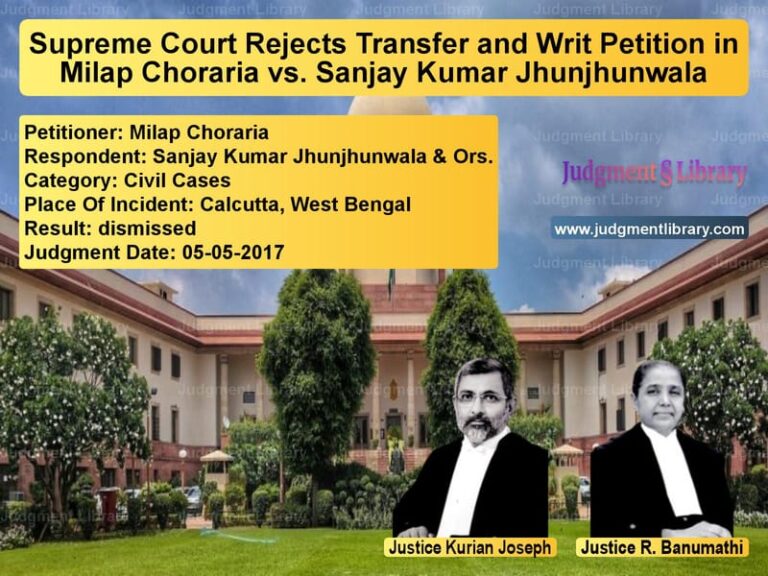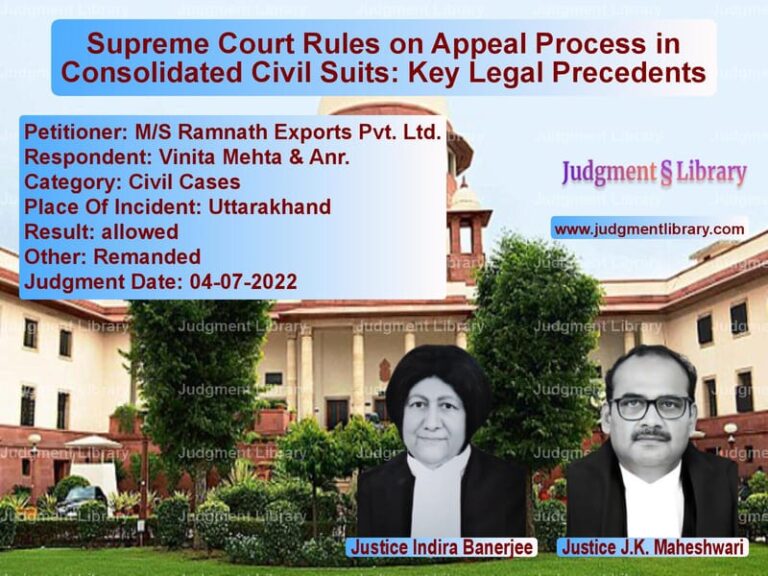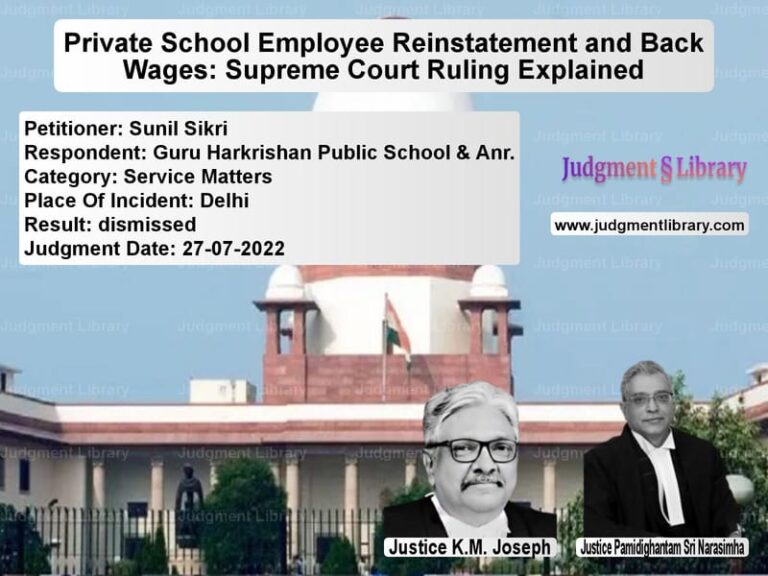Real Estate Fraud Case: Supreme Court Dismisses Homebuyer’s Plea Under Article 32
The Supreme Court of India recently ruled in the case of Upendra Choudhury vs. Bulandshahar Development Authority & Others, dismissing a homebuyer’s plea seeking judicial intervention in a stalled real estate project. The Court held that disputes related to real estate projects should be addressed through the appropriate statutory forums rather than invoking Article 32 of the Constitution.
Background of the Case
The case involved a homebuyer, Upendra Choudhury, who approached the Supreme Court under Article 32 of the Constitution, alleging large-scale fraud and mismanagement in the real estate project Sushant Megapolis. The project was being developed by the fifth, sixth, and seventh respondents, and the petitioner sought multiple reliefs, including:
- Cancellation of agreements with the developers and refund of money to homebuyers.
- Appointment of a court receiver or a committee headed by a retired Supreme Court judge to monitor the project.
- A forensic audit of all projects launched by the developers.
- Investigation by the Central Bureau of Investigation (CBI), the Serious Fraud Investigation Office (SFIO), and the Enforcement Directorate (ED).
The petitioner claimed that the developers had collected money from homebuyers without delivering the promised units and that state agencies had failed to take action against the fraud.
Petitioner’s (Upendra Choudhury’s) Arguments
The petitioner, through counsel, argued:
- Thousands of homebuyers had invested in the project, but construction was not completed within the promised time.
- The developers had allegedly siphoned off funds, causing massive financial losses to homebuyers.
- Given the scale of the fraud, state authorities were unable or unwilling to act, necessitating judicial intervention.
- The Court had previously entertained similar cases, such as Amrapali Group and Unitech, where homebuyers were granted relief.
Respondent’s (Bulandshahar Development Authority & Others) Arguments
The respondents countered the petitioner’s claims with the following arguments:
- The case involved contractual disputes between homebuyers and private developers, which should be resolved through statutory mechanisms such as RERA, consumer courts, or civil suits.
- There was no violation of fundamental rights that warranted invoking Article 32.
- The Supreme Court could not assume the role of a regulator in real estate disputes.
- The petitioner was a single homebuyer and could not represent the interests of all affected buyers.
Supreme Court’s Observations
The Supreme Court, comprising Justices D.Y. Chandrachud and M.R. Shah, made the following key observations:
- Real estate projects involve complex financial, administrative, and regulatory issues, which are best handled by statutory authorities rather than courts.
- Parliament has enacted specific laws such as the Real Estate (Regulation and Development) Act, 2016 (RERA), the Consumer Protection Act, 1986, and the Insolvency and Bankruptcy Code, 2016, which provide adequate remedies to homebuyers.
- The Court could not assume the role of a supervisory authority over a construction project.
- Judicial intervention is appropriate only when statutory remedies have been exhausted, which was not the case here.
The Supreme Court noted:
“A decision of a public authority which is entrusted with a public duty is amenable to judicial review. But it is quite another hypothesis to postulate that the decision-making authority should be taken over by the court. The latter is impermissible.”
Addressing the petitioner’s request for a judicially monitored committee, the Court stated:
“Managing a construction project is not within the jurisdiction of the court. This will inevitably draw the court into the day-to-day supervision of the project, including financing, permissions, and execution – something which lies beyond the ken of judicial review and the competence of the court.”
Final Judgment
The Supreme Court dismissed the petition, holding that:
- The petitioner should pursue remedies under RERA, consumer forums, or civil courts.
- Statutory agencies such as the SFIO, ED, or CBI could be approached through appropriate legal channels rather than directly invoking Article 32.
- The Court could not interfere in private contractual disputes unless there was a clear violation of fundamental rights.
- Homebuyers seeking relief in real estate disputes should approach the designated regulatory bodies instead of filing petitions in the Supreme Court.
Impact of the Judgment
This ruling has significant implications for homebuyers and real estate litigation:
- Clarification on Judicial Role: The Court reinforced that contractual disputes must be resolved through appropriate statutory mechanisms.
- Emphasis on RERA and Consumer Forums: The judgment affirms that RERA and consumer forums are the correct platforms for addressing grievances against real estate developers.
- Limiting Article 32 Petitions: The ruling prevents homebuyers from bypassing existing legal frameworks by filing writ petitions directly in the Supreme Court.
- Setting a Precedent for Real Estate Cases: The decision distinguishes real estate cases that require court intervention (such as Amrapali and Unitech) from those that should be handled by regulatory bodies.
Conclusion
The Supreme Court’s decision in Upendra Choudhury vs. Bulandshahar Development Authority & Others provides clarity on the judicial role in real estate disputes. It reaffirms that homebuyers should seek relief through designated statutory forums rather than invoking Article 32. By dismissing the plea, the Court has emphasized the importance of regulatory mechanisms such as RERA and consumer forums in handling real estate disputes efficiently.
This judgment serves as a crucial precedent, ensuring that real estate disputes are addressed through appropriate legal channels while preventing undue judicial intervention in contractual matters.
Petitioner Name: Upendra Choudhury.Respondent Name: Bulandshahar Development Authority & Others.Judgment By: Justice D.Y. Chandrachud, Justice M.R. Shah.Place Of Incident: Bulandshahar, Uttar Pradesh.Judgment Date: 11-02-2021.
Don’t miss out on the full details! Download the complete judgment in PDF format below and gain valuable insights instantly!
Download Judgment: upendra-choudhury-vs-bulandshahar-develop-supreme-court-of-india-judgment-dated-11-02-2021.pdf
Directly Download Judgment: Directly download this Judgment
See all petitions in Consumer Rights
See all petitions in Dispute Resolution Mechanisms
See all petitions in Contract Disputes
See all petitions in Judgment by Dhananjaya Y Chandrachud
See all petitions in Judgment by Mukeshkumar Rasikbhai Shah
See all petitions in dismissed
See all petitions in supreme court of India judgments February 2021
See all petitions in 2021 judgments
See all posts in Civil Cases Category
See all allowed petitions in Civil Cases Category
See all Dismissed petitions in Civil Cases Category
See all partially allowed petitions in Civil Cases Category







